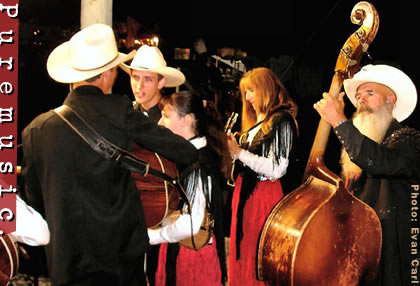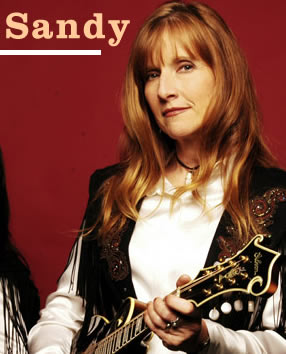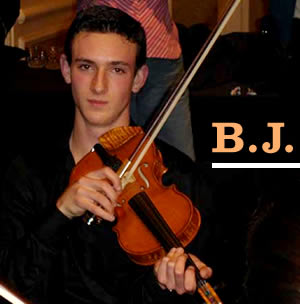
A Conversation
with Sandy Cherryholmes
Puremusic: As a relative newcomer to the fast-building legacy of the Cherryholmes family--
[laughter]
PM: --you can appreciate how astonishing it is to absorb all of the accomplishments and the accolades that are piling up so high, so fast, so young.
Sandy Cherryholmes: I know. It's mind-boggling.
PM: It's just unbelievable. I first heard about the family and the group when my friend Craig Havighurst did a piece on the IBMA on NPR.
SC: In fact, they're broadcasting that now. And I haven't heard it. I caught the last forty-five seconds of it when someone called and said it was on. But an agent that's with us said he's heard it today and said it was great, it was really well done.
PM: Oh, yeah. Craig is a very thorough and academic person, and he did a wonderful job. And then I saw him at a bonfire, at somebody's big party outside very soon after the piece had first aired. We talked about the family and the group. And he was really fired up about your whole story, and the reality of who you are and what you've done. I mean, you've really got a champion in him.
SC: [laughs] That's great.
PM: But I guess he's probably one of a long line, because you know how people love to champion someone who's really not just talented, but somebody who's good.
SC: Well, like I said, we've been amazed, because we just did what we did as a family for the sake of the family. And to have it have been so successful is--it's very awesome, and an awesome responsibility.

PM: Yes, an awesome happening, and an awesome responsibility. I can appreciate that. And along with being the entertainers of the year in the world of bluegrass, the family has become, really, one of the most interesting families in the nation.
SC: [laughs] That is so funny, because I guess that must be true, but we just don't see ourselves that way. We're people, and that's the way we see ourselves. It's far from being all that interesting.
PM: [laughs] And of course, people who see themselves as very interesting, they're not as interesting anymore, are they?
[laughter]
SC: Oh, I know. Like today--well, we're just outside of Oklahoma City right now, camped in a RV park right up against the freeway, and it's far from glamorous. We're plugging away at our school classes--the three of them are home-schooled--and it looks like an explosion in a classroom inside the bus. Jere is trying to sleep because he drove all night. There's nothing glamorous about this.
PM: But along the lines of me calling you--and I think rightfully so, being one of the interesting families in the nation at the moment--has anybody done a magazine piece on Cherryholmes from that kind of an angle?
SC: Not really, not mentioning it that way.
PM: Not per se. I've got to circulate that idea around to some of my writer friends, because somebody has got to be writing an article like that, and you guys should be in there.

PM: In this world, and in this day and age, how are you and Jere able to guide all your children, at least the four that are with you here, all so unerringly down this very unlikely path of virtuosity and young stardom?
SC: It's a funny thing, we haven't ever looked at it as anything extraordinary in our own selves. But from the very beginning, Jere and I just decided in the direction that the family needed to go. And our kids are--I guess maybe they're a lot like we are. I imagine that's a genetic thing. They seem to have always been able to have us tell them, "We're going to do this."
From the very beginning with the music, Jere and I decided we were going to teach these kids how to play some instruments. That would be a good idea: we're going to start a family band just so we have something special to do at home. And when we told them, a couple of them were real happy. And one of them could probably take it or leave it. And the other one really didn't want to play what he was playing. But everybody had the attitude, "Okay, if this is what we're going to do, then I guess it's what we're doing."
And then they enjoyed it. And we did it together. And it's been like that as it's progressed, as far as the band goes. As they got better and realized that people were responding to their ability, they grew, even in the first year when they had just started. They got off to great start. In just a relatively short time, they had the traits of kids who look like they might actually have some future talent.

We'd take them out to play at festivals just to jam. And people would comment. And that would make them want to try harder. In turn, it made us get different goals and learn more songs. Then we won a couple of contests, and that got everyone excited, and we thought, oh, gee, we could do some other good stuff. And every step, everybody seems like they've been willing to get on board and want to do it.
And then we've always talked about it--we'd say, "Well, how far do you want to go, now that we're going to get more work. Are you kids going to practice? Because you're going to have to practice if we're going to work." They'd say, "Yeah, we want to do it." And that went right up to the jump-off point when we finally sat down and said, "You know, we're considering selling everything and going full-time, what do you kids think? It's going to be a big sacrifice, and it's going to be hard. We're going to be on a road in a trailer, and we don't know what's going to happen or where we're going to be. But we can try it." And everybody said, "Okay. If that's what we can do, let's do it."
print (pdf) listen to clips puremusic home